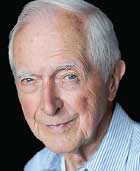Ah, To Be a Psychiatrist
Abstract

Robert McAllister, M.D., Ph.D., is a retired private practitioner and author. His latest book is Predator Priest.
My desire to help others came early in life. It was an uncertain path with no fixed goal. Growing up on a cattle ranch in Montana during the years of the Great Depression, I was aware of the marked poverty in the area. I was inspired by my mother and father who never let a stranger or a neighbor go hungry and who characteristically helped the “needy” out of their own sparsity. Their goal became my goal. Through the years “needy” was variously defined. In the 30s, it was poverty.
I studied to be a priest (to respond to spiritual need?) but left the seminary, for want of a life companion (my own neediness). After basic training, I was a combat infantryman in Austria. (Peace was the need.) It was a world of destruction and decay, disorder and death, concentration camps, POW camps, DP camps.
After the war I earned a Ph.D. in psychology from Catholic University. Dr. Robert Odenwald, a psychiatrist teaching there, encouraged me to study medicine and become a psychiatrist. I had depleted my G.I. bill, but various jobs made Georgetown possible. I got my M.D. in 1956 at the age of 37. Four more years: internship one, residency three.
I began the practice of psychiatry on September 1, 1960. It’s difficult to explain how it felt. It was clearly the goal I’d been looking for. I can’t say I was inspired to become a psychiatrist; it’s more like I stumbled into it, thanks to Bob Odenwald. The truth is that psychiatry has been an inspiration to me. I’ve learned the depth of sorrow, the breadth of goodness, the delicacy of childhood, the harshness of prejudice, the wickedness of abuse, the bitterness of vengeance, on and on. With compassionate psychotherapy and whatever medicines were appropriate, I’ve tried to mend damaged lives, lift shattered spirits, and bring peace to broken hearts (all DSM-4 labeled).
The world opened quickly for me. In 1966 I became superintendent of the Nevada State Hospital in Reno. We got the hospital accredited. We obtained a grant for the first comprehensive community mental health center in our region. We obtained a federal grant to educate staff. Howard Rome, Frank Braceland, Dana Farnsworth, George Valiant, Chet Pierce, and other notables honored us with their lectures. I met these stalwarts of the psychiatric world as fellow summer faculty at the Pastoral Mental Health Institute at St. John’s University in Collegeville, Minn. I published Conflict in Community (St. John’s University Press, 1969) and Living the Vows (Harper & Row, 1986). Both were well received by Catholic religious. As a result, much of my work related to the treatment of Catholic religious, consulting with and lecturing to their communities throughout the United States.
I taught at Catholic University, Gonzaga University in Spokane, Loyola University in Baltimore. I closed my psychiatric practice on December 31, 2005. My life’s love had Alzheimer’s (Jane’s need was my need). Then it all ended—almost.
After my wife’s death, I began “supervising” a social worker whom I knew from Taylor Manor Hospital. After she retired, I “supervised” her psychologist friend for several months. Then she retired. The three of us still get together every two weeks to discuss old cases, people who could be cases, and sundry aligned matters. Once you’re a therapist, the fire never goes out. It smolders.
At the age of 100, I attempt to communicate peace and calm and a sense of personal worth to those with whom I live in an adult care community. It’s what I was inspired to do and have done since I began life as a psychiatrist in 1960. ■



